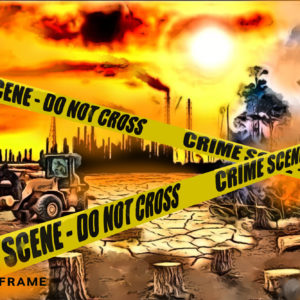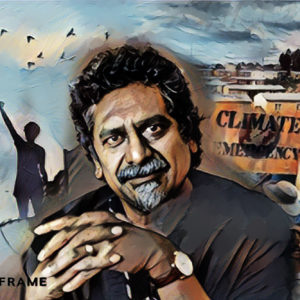Mainstream media ignore the end of the world
Climate change is now irreversible, but if you follow only South African news, which reports almost exclusively on elite interests, you would never know.
Author:
23 August 2021

If the world as we know it does end, don’t expect the South African mainstream to notice.
The United Nations Intergovernmental Panel on Climate Change (IPCC) issued a report on 9 August, Women’s Day in this country, which warned that some change in the climate was now irreversible. It added that there was still time to avoid the worst effects of climate change, but only if urgent action was taken over the next few years. Without that, the world could look forward to, at best, many more extreme weather events that could make parts of the planet unliveable.
Not surprisingly, the report was a major newsmaker around the globe. It was greeted by saturation coverage and comment, declarations by heads of government and calls for action by citizens’ organisations. In South Africa, the response was – well, just about nothing.
When the report was released, television led the way in ignoring it. One channel found the election (unopposed) of a new Johannesburg mayor more interesting – as well as, inevitably, yet another legal delaying tactic by Jacob Zuma’s lawyers. Another, keen to show it is up on world events, preferred covering the pressure on New York’s governor to resign.
Related article:
It is worth pondering these news judgements. A claim by a panel of the world’s top climate scientists that human life may become impossible in large parts of the planet unless we act very quickly is not newsworthy at all. It is absolutely trivial when compared to the routine ploys of politicians or sports results. The future of humanity on this planet is a non-event.
This initial burst of blissful ignorance was followed by a dribble of reporting and comment. Print media mentioned the report, as did some radio current affairs shows (television, to the best of my knowledge, has still not noticed). The environment minister, Barbara Creecy, issued statements setting out the government’s position. But none of this amounted to a major focus: the future of humanity did not command as much attention as the usual disputes between politicians on which the South African debate fixates.
Perhaps most revealing was that citizens’ groups had virtually nothing to say. There was no public outcry or anything that looked like serious pressure to act. The most noticeable and loud citizens’ groups, political parties, ignored the report entirely. There was no great outcry from environmental groups or anyone else – no public debate, which the report triggered in many other countries.
Why does South Africa’s mainstream not care whether the planet remains a place where we humans can live? Why is the most important issue humanity currently faces of no interest to a country where those who speak in the national debate consider themselves sophisticated and in tune with events in the rest of the world – which, in their mind, is North America and Western Europe?
Reporting for the rich
There are some obvious explanations, none of which are new: over a decade ago, I presented a paper arguing that climate change would not become an issue in this country. It spelled out reasons, all linked to the nature of this country’s politics and public debate.
Despite the mainstream’s fixation with Europe and America, it is quite insular. It rarely notices events on the rest of the continent, let alone beyond that. In other countries, demonstrations on global issues might attract hundreds of thousands. Here, they generally attract a few hundred. Perhaps because South Africa’s elites became used, under apartheid, to being noticed by the world, the idea that they should notice the world never occurred to them.
It is also no surprise that the country’s politics are more interested in what divides people than in what unites them. The constant refrain, usually at times of sporting success, that South Africans are deep down all on the same side, if only they cared to admit this, expresses a hope, not a current reality. The hope is also a symptom of the divisions; it usually means that we all should agree with the speaker’s view of the world.

A common threat to humanity does not sound like something a mainstream more interested in divisions would worry about. Even in its own terms, this is short-sighted because climate change can be a very divisive issue. But the mainstream debate clearly lacks the vision to see the climate as something about which to argue.
Finally, while climate change has become more mainstream around the world, it is an issue social justice campaigners take up. In this country – far more so now than 10 years ago – the campaigners who wield influence are usually found on digital media platforms rather than in streets, townships and shack settlements. There is no mass movement in support of any social justice issue, so why should climate change attract attention?
Yet, while all these explanations tell part of the story, they are, in a sense, side issues. There is no great mystery to why citizens and politicians around the world who ignored climate change are suddenly concerned. A wave of extreme weather events in Europe, North America and Australia, among other places, has concentrated people’s minds. Floods, wildfires and hurricanes have disrupted the lives of people who might not have cared about climate change before it wreaked havoc with them but who now need no convincing that it is a very serious problem.
Related podcast:
The mainstream here believes that this country has experienced none of these events and so it does not much care about them. People who dominate mainstream debates in most places, but particularly in this country, are only interested in threats when they actually cause damage, not when they are predicted by academics. There is no reason one of these calamities should not strike this country, but the mainstream has no plans to worry about this until and unless it happens (and possibly not even then, because all adverse effects can be blamed on cadre deployment).
Observant readers may have noticed that this article described the view that extreme weather events have not affected this country as a belief, not a reality. This is because South Africa is currently experiencing one such event – a drought, which arrived in 2018 and is still with us. But the mainstream does not care about the drought because it does not know about it. And the reason it does not know is that, while the drought has caused pain to many, it has not affected the lives of the people who shape the national debate. The victims are people living in poverty in rural areas and some townships whom the debate rarely sees and never hears.
The elites shape the debate. When all the theorising is done, the core reason they don’t care about climate change and other issues vital to the country’s future is that, so far, these issues mostly affect only the people the debate ignores. We should not be surprised that the future of humanity is not an important issue to elites here.


